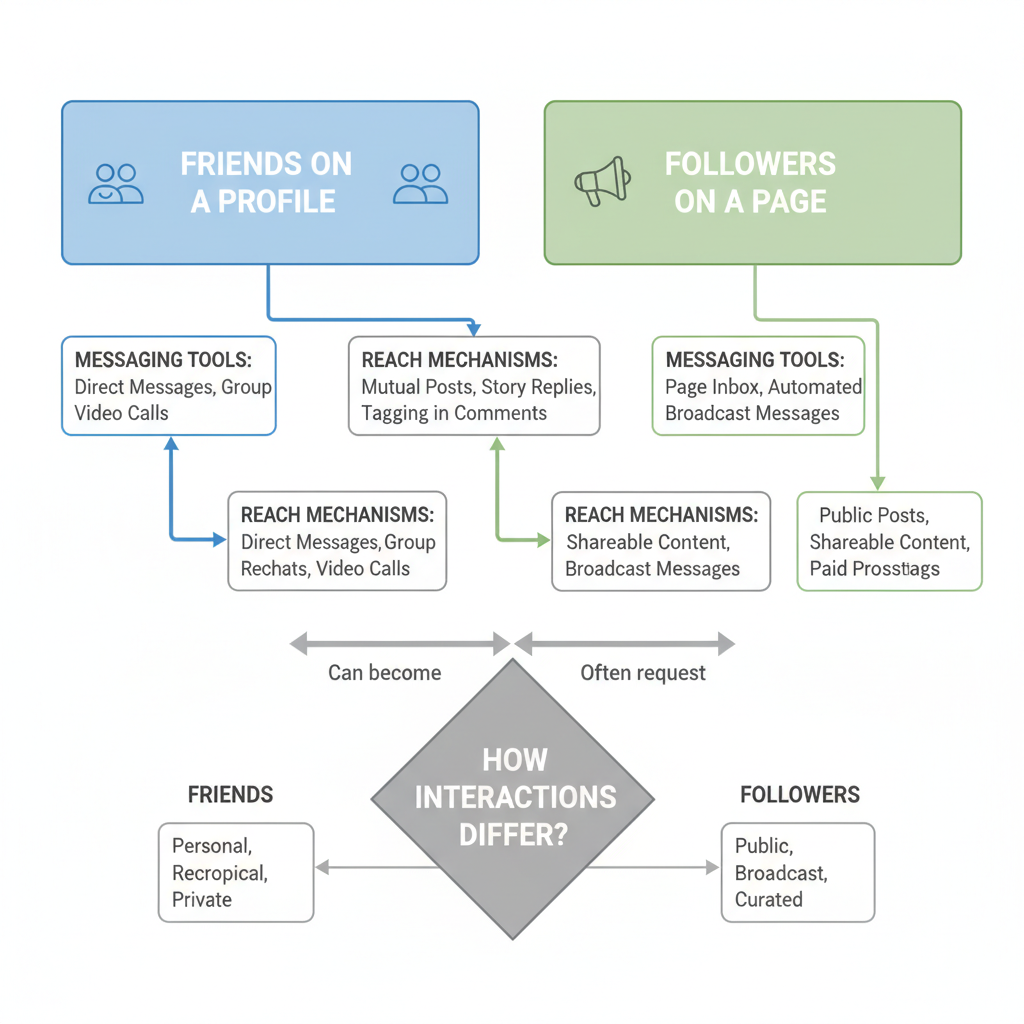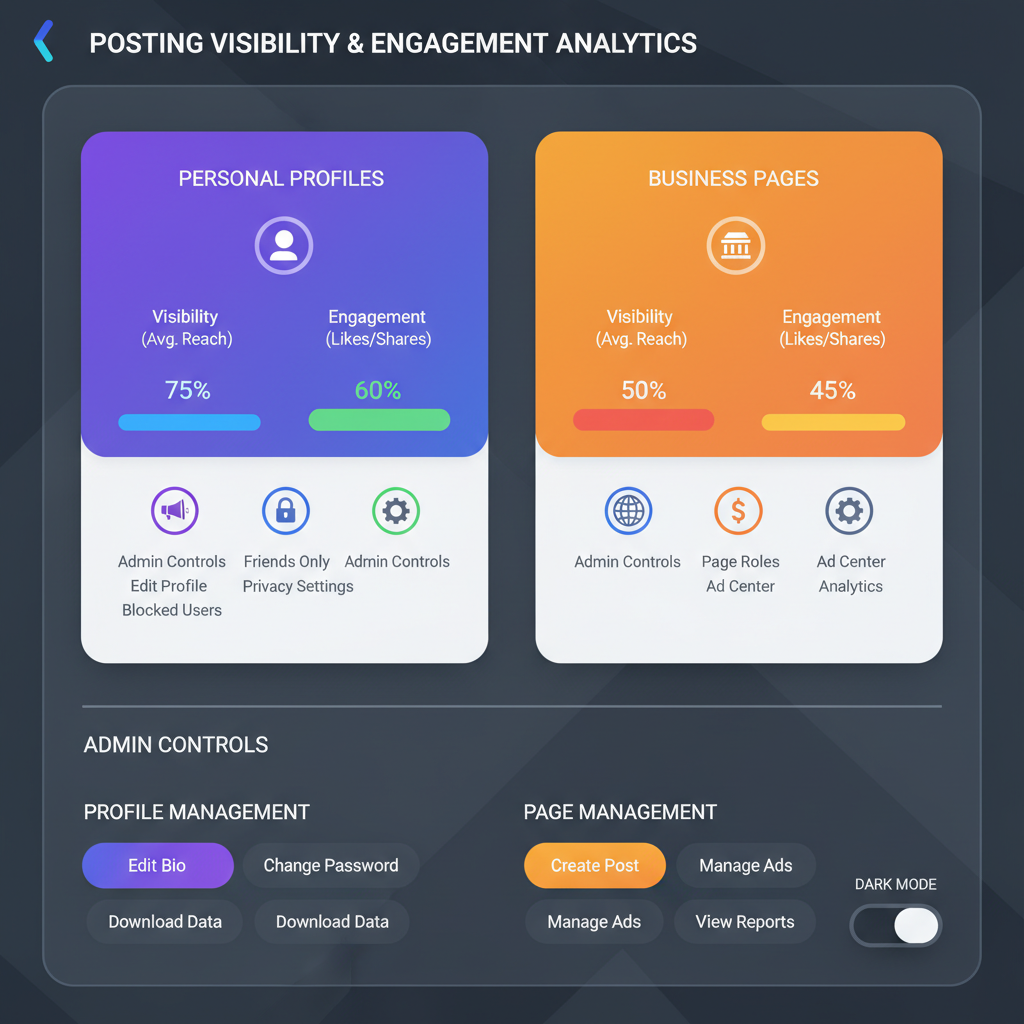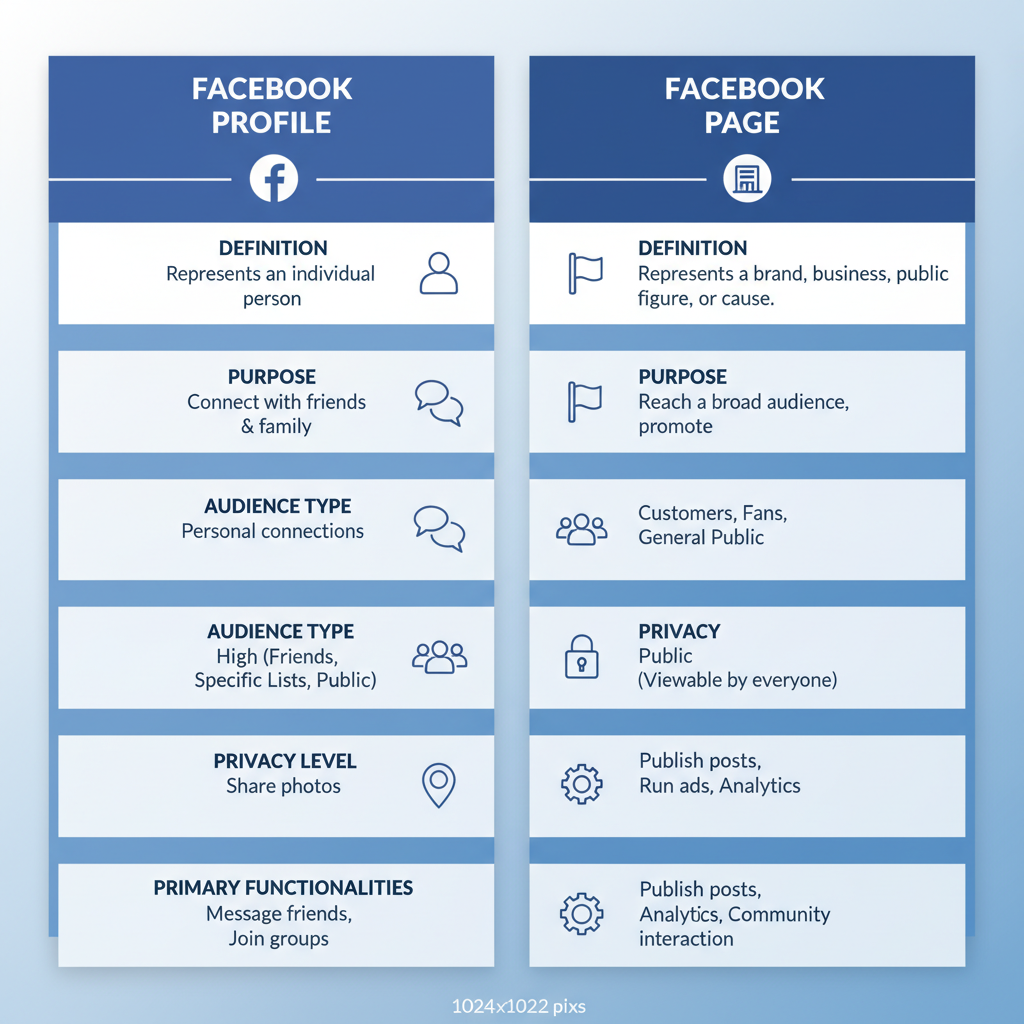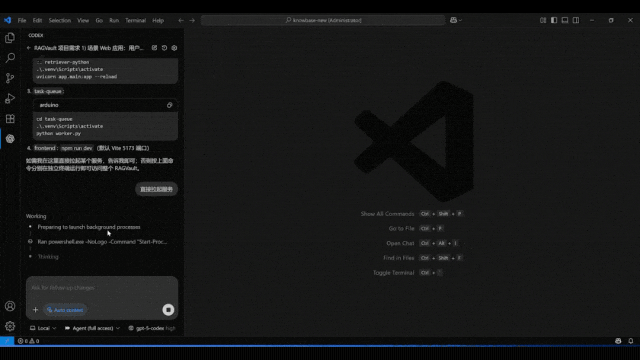Difference Between Facebook Profile and Page Features
Learn the key differences between Facebook profiles and pages, from privacy and engagement to analytics, tools, and advertising capabilities.

Introduction to Facebook Entities: Profile vs Page
Understanding the difference between FB profile and page is essential for anyone looking to use Facebook effectively—whether for personal connections or public outreach. While both allow you to post, share, and interact, they are designed for different purposes, with unique features and rules. Selecting the right entity impacts your visibility, engagement, and compliance with Facebook’s terms of service.
For individuals seeking personal interaction, a profile is meant to represent you as a real person. For brands, public figures, nonprofits, or organizations, a page offers tools and visibility to manage a public presence professionally.

---
Definition and Purpose of a Facebook Profile
A Facebook profile represents an individual user. It’s the standard account you create upon joining Facebook, complete with:
- Your real name: Required under Facebook’s community standards.
- Personal details: Such as hometown, schools, work, or hobbies.
- Friend network: Ability to send and receive friend requests (up to 5,000 friends).
- Private engagement: Messenger chats, joining groups, and personal comments.
Profiles are meant exclusively for personal use, not for representing brands, companies, or organizations.
---
Definition and Purpose of a Facebook Page
By contrast, a Facebook page is intended for public-facing entities such as:
- Companies and brands
- Celebrities and influencers
- Nonprofits and community initiatives
- Events and campaigns
Pages can be built from scratch or converted from a personal profile. They rely on people “liking” or “following” rather than mutual friend requests. This public format unlocks marketing, analytics, and engagement tools built for professional growth.

---
Key Functional Differences Between Profile and Page
Friends vs Followers
- Profile: Restricted to mutual friend requests (max 5,000 friends).
- Page: Unlimited followers; anyone can follow without approval.
Messaging Features
- Profile: One-to-one Messenger communication with friends.
- Page: Business Inbox with customer service tools and auto-replies.
Posting and Reach
- Profile: Posts visible to friends or custom audiences.
- Page: Posts are public by default; can be targeted, scheduled, or boosted.
---
Privacy Settings: Personal Control vs Public Access
Profiles offer flexible privacy settings:
- Control audience for each post (friends, custom lists, or public).
- Limit personal information visibility.
Pages are inherently public:
- Content can be viewed without being logged in.
- Privacy restrictions are minimal to maximize reach.
---
Content Types and Unique Tools
While both can post photos, videos, Stories, and host Live streams:
- Pages: Include tools such as Shops, Events, Offers, third-party integrations, and call-to-action (CTA) buttons.
- Profiles: Limited to personal posts and small-scale event creation, without marketplace sales options for businesses.
Extra tools for pages include:
- Post scheduling
- Branded content workflows
- Crossposting capabilities

---
Analytics and Insights: Only for Pages
One clear difference between FB profile and page lies in analytics:
- Profiles: No access to engagement metrics.
- Pages: Facebook Insights offers post reach, page views, clicks, engagement rates, demographics, and growth trends.
Typical page metrics include:
- Organic vs paid reach
- Actions taken on the page
- Video views and audience retention
- Follower growth over time
---
Advertising Capabilities
Only pages can legally run paid ads:
- Boosting: Promote posts for expanded reach.
- Ad Manager: Create campaigns with advanced targeting.
- Audience Tools: Use custom and lookalike audiences to find potential customers.
Profiles attempting to advertise risk violating Facebook’s terms.
---
Verification and Trust Signals
Facebook verification badges increase credibility:
- Blue Badge: Confirmed authenticity for notable pages or public figure profiles.
- Pages: Often eligible for verification.
- Profiles: Verified only if representing a well-known individual.
---
Facebook Terms and Limitations
Facebook enforces different rules for each:
- Profiles: Must represent real people—no fake names or business use.
- Pages: Must represent legitimate organizations and are the only format for commercial activity.
- Using a profile for business can result in account loss.
---
Choosing the Right Option
Opt for a Profile when:
- Your focus is personal life sharing.
- You want to connect socially without marketing.
Opt for a Page when:
- You represent a brand or public initiative.
- You require analytics, targeted reach, and ad tools.
---
How to Convert a Profile to a Page
If you’ve been using a profile incorrectly for business use:
- Log into your profile.
- Visit Facebook’s Profile to Page Migration tool.
- Select a page category (e.g., local business).
- Friends become followers; select content to move.
The original profile remains, separate from the new page.
---
Common Mistakes and Misconceptions
- Using personal profiles for brands creates compliance risks.
- Pages cannot send friend requests—only invite people to follow.
- Profiles lack analytic tracking and ad capabilities.
- Poor page optimization reduces visibility and engagement.
---
Summary Table: Profile vs Page Comparison
| Feature | Facebook Profile | Facebook Page |
|---|---|---|
| Purpose | Personal networking | Brand/business/public identity |
| Connection Type | Friends (up to 5,000) | Followers/Likes (no limit) |
| Privacy Controls | Adjustable per post | Public by default |
| Analytics | Unavailable | Facebook Insights |
| Advertising | Prohibited | Full ad suite |
| Content Tools | Basic media posts | Shops, Events, CTAs, Offers |
| Verification | Rare (public figures) | Available for notable entities |
| Friend/Follow Limit | Friend limit of 5,000 | Unlimited followers |
| Messaging | Private chats | Business inbox, auto-replies |
---
Conclusion: Selecting for Compliance and Success
In essence, the difference between FB profile and page is about purpose, feature set, and compliance. Personal users should stick to profiles for friendships and private life sharing. Brands, organizations, and public figures unlock far more potential with pages—gaining access to analytics, ad tools, and unlimited audience reach.
Choosing the right entity allows for effective communication, compliance with Facebook’s policies, and strategic growth. If you want to network socially, maintain a personal profile. If you’re seeking brand visibility or community building, create and optimize a page—your audience and results will thank you.



